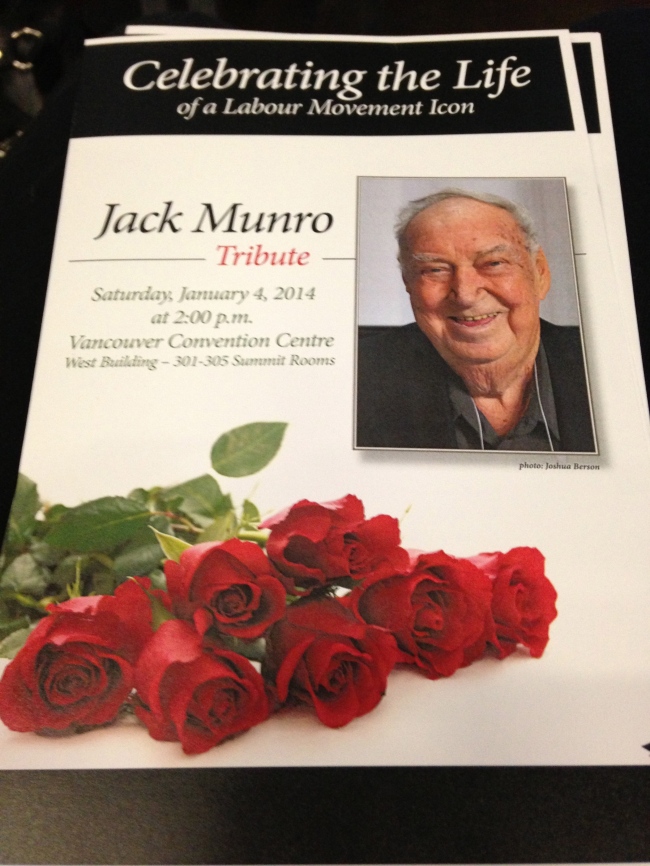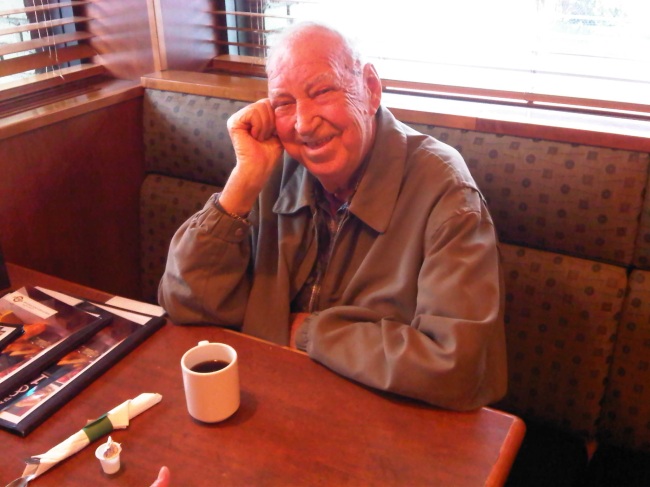Hundreds turned out on a brilliant sunny Saturday afternoon to say a final farewell to Jack Munro, who died last November, after as full an 82-year life as could be imagined.
I’ve already written a lot about Big Jack, but I believe it’s merited. (Here’s my obituary on Munro.) When was the last time a leader of a trade union was as prominent in this province as Munro was for 30 years? It was unheard of even then, when labour mattered, and that prominence is highly unlikely to be repeated for any current or future labour leader. As Vancouver Sun photographer Steve Bosch acutely observed, after hearing excerpts of some fiery Munro speeches that were replayed at the memorial: “We may be the last generation to hear that kind of talk.” Heck, there aren’t even any labour reporters in the mainstream media to celebrate big time union leaders, even if there were any. The peril of this dearth of expertise was amply illustrated by one newspaper account of Munro’s memorial, which said the gathering attracted “union brass and the working class”, as if they were separate categories.
In the case of Jack Munro, the clichés fit. He really was larger than life and one of a kind, towering over other personalities. Yes, many things about him were controversial. He was no angel. He could be a bully, particularly in the days when he was drinking. And his relatively moderate approach to many issues attracted criticism from activists and the so-called “left”. He believed in deal-making over confrontation. That’s one reason he was respected by many on the company side of the ledger. “Hey, a union leader we can do business with…”
But there was never any doubt which side Munro was on. He represented workers. To his dying day, he believed in the virtues of trade unionism and the integral role they play in society. “He made us proud, proud to be workers, and proud to have him as our leader,” said Harvey Arcand, who used to head the IWA’s Williams Lake local.
Munro’s final years were spent spearheading efforts by the Labour Heritage Centre to collect and promote union and worker history as a way of ensuring that their contribution to building British Columbia would not be forgotten, amid all the celebration of politicians and corporate pioneers. After more than half a century in the labour movement, it was hardly something he needed to do. But he never lost his fire in the belly for the importance of trade unions to the province’s economic and social justice fabric.
Saturday proved a good send-off, attracting a diverse crowd, including ex-premiers, current politicians, business representatives and a wide-cross section of the labour movement, from leaders to the rank-and-file. And of course, there were yet more stories about a guy who was more colourful than a Ted Harris paint store. I never tire of them.
Fighting back tears during his eulogy to the man who mentored him, Ken Georgetti told of a time Munro was down south in the United States during an IWA organizing drive. As he sat in a small town café for a bite to eat, Munro heard the owner lay a verbal licking on one of his employees. “The employer was white, the employee was black, and Jack saw red.” He stood up, all 6’5”, 250 pounds of him, and demanded the owner apologize. When he resisted, Munro tossed him out and locked the door, until he complied. “Jack reminded us the world can be a better place, if we dedicate ourselves to the fight,” said Georgetti.
Harvey Arcand recalled a case before BC Labour Relations Board chairman Don Munroe (note the ‘e’). Jack Munro started berating a company witness from the back row, prompting Don Munro to ask for a little decorum. “What the hell do you know about decorum?” the IWA president hollered back. “You don’t even know how to spell Munro!”
Angela Schira, former secretary-treasurer of the B.C. Federation of Labour, remembered sitting beside Munro during a speech at a Fed convention by the eloquent Stephen Lewis. The blunt-speaking Munro was not impressed by Lewis’s rich vocabulary. “Why do we have to have a speaker that you need a dictionary to understand?” he wondered out loud.
Another time, Schira related, Munro was chairing a Fed convention, as a speaker on Mike Four droned on, reading from what appeared to be a leftist tract. When Munro reminded him his allotted time was nearly up, the speaker complained that the interruption caused him to lose his place. “I’ll help you out,” said Munro, from the podium. “I recognize the brother on Mike Five.”
In addition to the speeches, there was a good video of Big Jack’s life, with some wonderful examples of Munro in full god-damn verbal flight. Ah, the memories. The video ended with the chorus of John Lennon’s terrific, albeit bitter, song. “A working class hero is something to be.”
At the conclusion of the memorial, emcee Stephen Hunt of the Steelworkers, which absorbed the IWA in 2004, announced that the union’s building would now be known as the Jack Munro Building. Well done.

